As part of extensive in-country research for the newly-released 2024 edition of the Business Advantage PNG annual magazine, our editorial team spoke exclusively to dozens of Papua New Guinea business leaders to understand how they are preparing for imminent growth – and what challenges they face. Here’s what they told us.
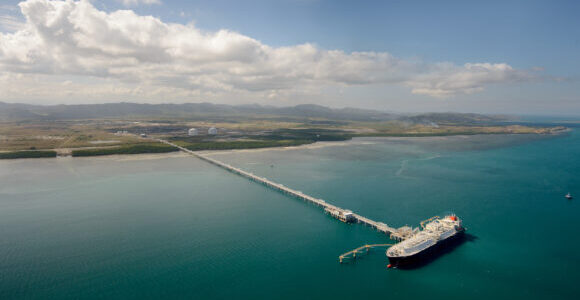
ExxonMobil’s Kumul marine terminal at Caution Bay outside Port Moresby. PNG’s LNG exports look set to increase substantially over the coming decade. Credit: ExxonMobil/R Dellman
If 2023 was the year Papua New Guinea started to gear up for an anticipated decade (or more) of major new investment, primarily in its resources sector, then 2024 is expected to mark the actual start of that decade.
An estimated US$50 billion pipeline of resources projects is lined up for development. Even without these projects, the International Monetary Fund (IMF) expects PNG’s GDP to grow by five per cent in 2024, stabilising at around three per cent in the years thereafter.
“Like most PNG businesses, we are cautiously optimistic that 2024 will see improved economic conditions,” says Mark Robinson, CEO of PNG’s largest bank, BSP Financial Group.
“These large extractive projects are critical for PNG’s economic growth and their flow-on impacts for PNG businesses will be profound.”
Underground movement
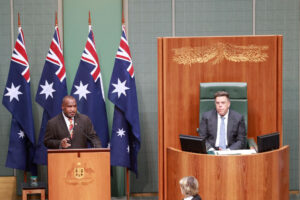
Papua New Guinea Prime Minister James Marape (L) talks to members of the House of Representatives and Senators in Parliament House in Canberra on January 8, 2024. (Photo by Hilary Wardhaugh / AFP)
The first of these projects, the restart of the Porgera gold mine, is already under way.
Closed since 2020, while terms for an extension to its special mining lease were negotiated, Porgera officially reopened at the end of 2023 under a new ownership structure, which will divide the benefits more evenly between local and international interests.
PNG has missed the foreign exchange the mine brought in during its first 30 years, and its restart will undoubtedly help mitigate the country’s longstanding forex shortages – nominated by the country’s CEOs as the number one impediment faced by business – as well as create an estimated 3,000 new jobs this year alone.
PNG’s next anticipated resources project is new and substantially larger: the US$10 billion TotalEnergies-led Papua LNG project. The country’s second gas project, it will represent the second-largest foreign direct investment in its history, as and when it commences.
While there have been several delays, this week Total Energies’ Chairman and CEO, Patrick Pouyanné, reaffirmed that his company and its international partners ExxonMobil, Santos and JX Nippon, remain “fully committed” to Papua LNG. He also informed PNG’s Prime Minister James Marape that the project requires more work to reach a final investment decision, now expected in 2025. The “slight delay” will not affect the early works planned for 2024.
PNG LNG expansion
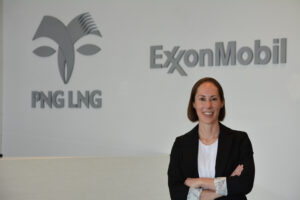
ExxonMobil PNG’s Tera Shandro
Meanwhile, the operator of PNG’s first gas project, ExxonMobil, is working to complete the Angore Pipeline Tie-In Project in Hela Province. Natural gas from the US$1.3 billion project is expected at its Caution Bay plant in 2024.
“As Papua New Guinea’s only significant gas development currently under construction, we expect Angore to bring on additional gas volumes later this year to supplement the existing PNG LNG gas production,” Tera Shandro, Chairperson and Managing Director at ExxonMobil Papua New Guinea, tells Business Advantage PNG.
As delegated downstream operator for the TotalEnergies-led Papua LNG project, ExxonMobil’s LNG Plant at Caution Bay would – pending a successful Final Investment Decision (FID) – see its production capacity increase to accommodate increased volumes associated with Papua LNG.
With rising demand for LNG as a replacement fuel for coal in Southeast Asia, construction of ExxonMobil’s next project, P’nyang, could quickly follow the four-year construction of Papua LNG. A more recent and very promising discovery from ExxonMobil, Wildebeest, could further extend PNG’s decade of construction out to 13 years.
Finally, the permitting of two new major mining projects is expected to progress this year, according to Mineral Resources Authority’s Managing Director, Jerry Garry.
The first is the Wafi-Golpu copper-gold project in Morobe Province, a joint venture between Harmony Gold and, following its November 2023 acquisition of Newcrest Mining, Newmont Corporation, now the world’s largest gold miner. The second is the Frieda River gold project, which has lately received increased interest from its developer, PanAust of China’s Guangdong Province.
Uplift

Kina Bank’s Greg Pawson.
While the big spending won’t start until some final investment decisions are made, there was a noticeable lift in business activity in the second half of 2023.
“The investment we’re seeing is really about preparing ourselves for that growth and we’re seeing the early signs of it,” observes Greg Pawson, CEO of Kina Bank. “2023 was a record year for us in lending.”
Optimism aside, the general sentiment among business leaders is that PNG’s government also needs to do its part to ensure that a positive signal is communicated to investors: by improving enabling infrastructure, making the regulatory environment more conducive to investment, boosting education and training, and improving PNG’s law and order situation.
“Foreign exchange remains a significant challenge for government to resolve going forward”
That latter task was made harder after looting and rioting in January 2024 resulted in significant damage to both property and business morale in PNG’s capital, Port Moresby – not to mention loss of life. Although the declaration of a two-week state of emergency in the capital and the appointment of a taskforce to examine the causes helped to restore order in the short-term, affected businesses are understandably seeking more tangible assistance from government.
Ironically, the unrest was preceded just weeks before by the announcement in the 2024 National Budget of a 9.5 per cent increase in funding for the law and justice sector, including the recruitment of an additional 500 police per year, which will be underpinned by a new bilateral security agreement signed with Australia.
Government finances
Improved receipts from the resources sector are one of the reasons the national government was able to announce record expenditure in the 2024 National Budget.
This increase in spending was also underpinned by a projected 14.5 per cent increase in tax receipts, and an 8.9 per cent increase in donor grants.
With its debt rising to 60 per cent of GDP due partly to the economic shock of COVID-19 as well as natural disasters, the government has taken steps to ensure its finances are under better control.
A key step in this process has been the commencement of a three-year program with the International Monetary Fund, focusing on fiscal repair, addressing foreign exchange shortages, and reforming the operation of the Bank of Papua New Guinea, PNG’s central bank.
“This is not a typical IMF program in the sense that, in the past, countries will wait to get into a crisis then they’ll come and seek assistance from the IMF,” explains Sohrab Rafiq, the IMF’s Resident Representative in PNG. “In this case, there’s no crisis. The government just wanted help with their reform agenda, and that’s what we are here to support and provide assistance to.”
“In that sense, from our perspective, their borrowing has been prudent, within the limits set by the IMF program,” says Rafiq, who notes PNG successfully completed its first review under the program at the end of 2023.
Forex a continued constraint
Bank of PNG Chairman, David Toua
PNG’s long-term shortage of foreign exchange (forex) has been another focus of the program, with the Bank of PNG being encouraged to release more exchange to the market to address ongoing strong demand.
“The Bank of PNG significantly increased the amount of currency available in 2023, injecting over US$1.5 billion into the market, but even that was not enough to satisfy demand,” admits central bank Chairman David Toua.
“Foreign exchange remains a significant challenge for government to resolve going forward,” notes Ces Iewago, Managing Partner of KPMG in PNG. “Business investment remains stifled, with supply chain and missed growth opportunities evident across the economy.”
For example, PNG’s largest fuel supplier, Puma Energy, took up around a third the Bank of PNG’s forex allocation in 2023. In February 2024, it announced that it would reduce its PNG operations, partly due to the difficulty of obtaining sufficient forex, with a consequent impact on fuel supply.
Ultimately, the answer to PNG’s forex problem appears to be twofold: a gradual adjustment in the value of the kina, now under way (the IMF considers it over-valued by around 13 per cent), and more investment dollars, which the new resources projects should bring.
“The only way this will change is if we are able to significantly increase economic activity in Papua New Guinea and stop the outflow of currency,” observes David Toua.
Non-resources economy
Aside from the resources sector, PNG’s economic performance has been uneven as PNG entered 2024. Retail has been flat, with ongoing inflation affecting grassroots consumer spending. But there are some positive signs.
“The good news is that we have seen the property market come back to pre-COVID levels,” notes superannuation fund Nasfund’s CEO, Rajeev Sharma. “We’re looking at some investments in that area. We don’t have a lot of vacancies in our residential sector.”
“The property market has had a strong rebound post-COVID and we’re expecting it to continue to strengthen,” agrees Rupert Bray, Managing Director of Steamships Trading Company, another member of the PNG Property Developers Association.
Steamships is behind the 38-acre Portside Business Park adjacent to Port Moresby’s international port and Harbourside South, which features the country’s first Marriott-branded residences, as well as the new Wonye Dobel development in Mt Hagen.
The government’s policy of encouraging special economic zones, while nascent, is also starting to galvanise interest from anchor investors, such as Kumul Petroleum Holdings’ fabrication facility at Caution Bay and a recently announced Raddison Blu resort at Paga Hill in the capital.
Infrastructure
Meanwhile, infrastructure investment continues, with the next phase of the fibreoptic National Transmission Network aiming to bring broadband internet to all 22 of PNG’s provinces by 2027, while retail telco Vodafone PNG, which launched in 2022, is continuing to build out an all-new mobile tower network to compete with market leader, Telstra-owned Digicel PNG.
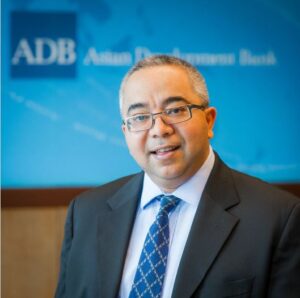
The Asian Development Bank’s Said Zaidansyah
The Asian Development Bank’s US$680 million Sustainable Highlands Highway Investment Program, underpinning the government’s 20-year Connect PNG roadbuilding program, is just one of a number of programs funded by international development organisations aimed at strengthening PNG’s infrastructure.
“We have a portfolio of about US$1.38 billion in the country, covering roads, civil aviation, energy and other key sectors,” notes the ADB’s PNG Country Director, Said Zaidansyah, adding that the transport sector is 60% of ADB’s portfolio in the country.
While some work has been done to strengthen PNG’s power and water utilities, business leaders tell Business Advantage PNG these are two areas where improvement is still urgently needed, especially if PNG is to meet its ambitions of providing 70 per cent of the population with electricity by 2030.
Upside, downside
If PNG’s pipeline of promising resources projects represents a positive upside risk for investors, there are also some downside risks to note.
As an exporter of mineral and agricultural commodities, PNG is exposed to the volatility of global prices, and the potential impact of the drier El Nino weather pattern in 2024.
“If you look at PNG’s inflation performance, historically, it’s been quite closely correlated with climate developments,” observes Rafiq.
Then there is PNG’s own political cycle. PNG’s Organic Laws guarantee political stability after each national election by forbidding a vote-of-no-confidence against the incoming government for a grace period of 18 months. That grace period has now expired. While a robust democracy is a feature of PNG’s political life, business is hoping that disruptions to key projects and policy decisions can be kept to a minimum this year, with so much at stake.
At the level of individual businesses, many told Business Advantage PNG that the ‘war for talent’ which started at the end of 2022 is starting to heat up, with many employers strengthening their focus on staff retention strategies, especially of key skilled workers.
This is an edited version of an article first published in the 2024 annual print edition of Business Advantage Papua New Guinea, PNG’s premier business and investment guide, which is available now at www.businessadvantagepng.com/annual.



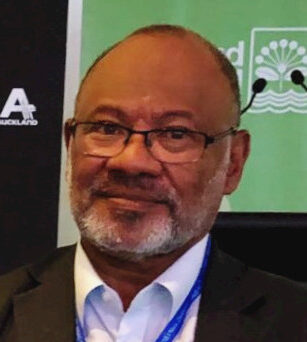





Speak Your Mind